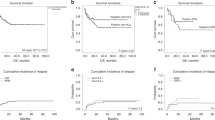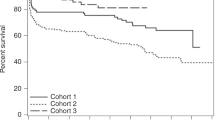Abstract
Risk of developing some cancers is markedly increased in settings of immune suppression including after solid organ transplants and in persons with inherited immune-deficiency disorders and those with HIV-1 infection. These cancers include lymphomas, melanoma and non-melanoma skin cancers, kidney and cervical cancers, Kaposi sarcoma and neuroblastoma. There are no reports of an increased acute myeloid leukemia (AML) in settings of immune suppression. This is curious because some data suggest the immune suppression may be important in increasing AML risk in experimental settings, and that immune stimulation may be useful in treating AML. To see whether immune suppression is correlated with an increased risk of developing AML, we analyzed data from 248224 recipients of kidney (N=217219) and heart (N=31005) transplants. Among the kidney transplant recipients, the standardized incidence ratio (SIR) for developing AML was 1.90 (95% confidence interval, 1.4–2.4; P<0.001). Among the heart transplant recipients, the SIR was 5.1 (3.4–7.1; P<0.001). These data suggest immune suppression increases risk of developing AML and that this risk is even higher, following intense prolonged immune suppression. Implications for AML development and therapy are discussed.
This is a preview of subscription content, access via your institution
Access options
Subscribe to this journal
Receive 12 print issues and online access
$259.00 per year
only $21.58 per issue
Buy this article
- Purchase on Springer Link
- Instant access to full article PDF
Prices may be subject to local taxes which are calculated during checkout

Similar content being viewed by others
References
Smits EL, Berneman ZN, Van Tendeloo VF . Immunotherapy of acute myeloid leukemia: current approaches. Oncologist 2009; 14: 240–252.
Vajdic CM, van Leeuwen MT . Cancer incidence and risk factors after solid organ transplantation. Int J Cancer 2009; 125: 1747–1754.
Heslop HE . How I treat EBV lymphoproliferation. Blood 2009; 114: 4002–4008.
Adami J, Gäbel H, Lindelöf B, Ekström K, Rydh B, Glimelius B et al. Cancer risk following organ transplantation: a nationwide cohort study in Sweden. Br J Cancer 2003; 89: 1221–1227.
Vajdic CM, McDonald SP, McCredie MR, van Leeuwen MT, Stewart JH, Law M et al. Cancer incidence before and after kidney transplantation. JAMA 2006; 296: 2823–2831.
Villeneuve PJ, Schaubel DE, Fenton SS, Shepherd FA, Jiang Y, Mao Y . Cancer incidence among Canadian kidney transplant recipients. Am J Transplant 2007; 7: 941–948.
Grulich AE, van Leeuwen MT, Falster MO, Vajdic CM . Incidence of cancers in people with HIV/AIDS compared with immunosuppressed transplant recipients: a meta-analysis. Lancet 2007; 370: 59–67. Review.
Horowitz MM, Gale RP, Sondel PM, Goldman JM, Kersey J, Kolb HJ et al. Graft-versus-leukemia reactions after bone marrow transplantation. Blood 1990; 75: 555–562.
Offman J, Opelz G, Doehler B, Cummins D, Halil O, Banner NR et al. Defective DNA mismatch repair in acute myeloid leukemia/myelodysplastic syndrome after organ transplantation. Blood 2004; 104: 822–828.
Acknowledgements
Drs John M Goldman, A John Barrett, Axel Hoos, Jeffrey Molldrem and Antoni Ribas kindly reviewed the typescript. We are grateful for support from the NIHR Biomedical Research Centre funding scheme.
Author information
Authors and Affiliations
Corresponding author
Ethics declarations
Competing interests
RPG is an employee of Celgene Corp. GO declares no conflict of interest.
Rights and permissions
About this article
Cite this article
Gale, R., Opelz, G. Commentary: does immune suppression increase risk of developing acute myeloid leukemia?. Leukemia 26, 422–423 (2012). https://doi.org/10.1038/leu.2011.224
Received:
Revised:
Accepted:
Published:
Issue Date:
DOI: https://doi.org/10.1038/leu.2011.224
Keywords
This article is cited by
-
Pregnancy, a test case for immunology
Synthese (2024)
-
Can Immune Therapy Cure Acute Myeloid Leukemia?
Current Treatment Options in Oncology (2023)
-
Association between multiple sclerosis, cancer risk, and immunosuppressant treatment: a cohort study
BMC Neurology (2017)
-
Establishment and characterization of HROC69 – a Crohn´s related colonic carcinoma cell line and its matched patient-derived xenograft
Scientific Reports (2016)
-
Is there really a specific graft-versus-leukaemia effect?
Bone Marrow Transplantation (2016)



